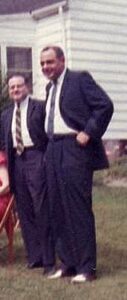SEWING MACHINE GUY
My parents stopped hanging around with rich people because my parents couldn’t afford to. One of my dad’s childhood buddies built shopping centers. My father was not going to spend money at fancy restaurants with him for no good reason. My parents socialized mostly with self-employed business people — a hardware store owner, the sewing machine guy and a shoe store guy.

(R) Alex Kozak, 1962. Stratton backyard.
The sewing machine person, Alex Kozak, sold record albums to me. Appliance store owners used to sell records. Mr. Kozak was a World War II Red Army veteran — a Hungarian Jew who escaped the Nazis and fought with the Russians. I borrowed his cavalry boots for my high school Canterbury Tales presentation. Mr. Kozak was a big man — one-and-a-half Isaac Babels. Mr. Kozak sold me Bechet of New Orleans and Be-Bop Era., both RCA Vintage Series LPs.
My dad liked hanging around with the Holocaust survivors; many of the men knew baseball, and they were for the most part no-nonsense. What was there to talk about — the good old days?
—
Yiddishe Cup gigs for Holocaust survivors’ luncheons were difficult. The crowds often wouldn’t pay attention. They would kibitz during the music. Another thing, the organizers would sometimes say “just a short program for the survivors.” How long was a “short program” exactly?
I had a classmate, Gary (not his real name), who re-told his parents’ Nazi horror stories for the Cleveland Press. This was in the 1960s — pre-“Holocaust,” the term. Gary’s father worked at a kosher poultry market. Gary was religious. He often stayed home for obscure (to me) Jewish holidays, like Succot. Some of the Jewish kids teased him when he came back. The non-Jews were oblivious.
I emulated Gary’s “Let’s go, Jews!” writing style. I wrote a letter to the Cleveland Press protesting the first U.S. Christmas stamp with a religious symbol (Madonna and child), 1966. I said the stamp violated the separation of church and state. I got letters. One reader said, “Go to Vietnam where men are men and not homosexual like you.” That motivated me — not to go to Nam but to write more letters. I wrote about Poland expelling its last Jews in 1968. What would the Poles do when they ran out of Jews? That letter, too, got some play. I vied with Gary for champion Jewish teenage letter writer. All I had to do was write “Jew” and I would get half-baked, vitriolic feedback. I had been through so little and wanted to experience World War II (without the pain). Then go home and eat some Jell-O.
Sewing machine guy: About 20 years ago, at a klezmer concert in Detroit, I ran into Mr. Kozak’s older daughter for the first time in decades. She told me her nephew had the cavalry boots now — the ones Mr. Kozak had worn as he rode through Prague with the Soviets in 1945, and the ones I had worn in high school English class.




4 comments
What do you mean by “the Jews were expelled from Poland in 1968?” I don’t see how that’s possible, legally or in any other way, and also there are thousands of Jews in Poland today.
thanks, Bert. Good piece. Do you still have those records? I wish I did. Your memory reminds me of a short story I read in college, about a boy who wore family heirloom clothing, in his case a child-size Cossack outfit, as a Halloween costume. (It ended badly.) So, who were you playing in The Canterbury Tales? Not the Wife of Bath, I assume.
Known fact, Kenny G. Look it up on Wikipedia and Polin museum site. Most of the Jews in Poland left in 1968 due to officially sanctioned Polish Communist anti-Semitism.
DK,
I think I was the Pardoner.
Leave a Comment